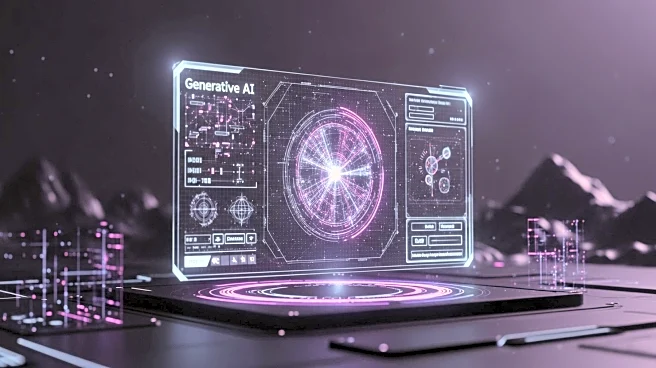What's Happening?
Electronic Arts (EA) is actively exploring the use of generative AI technologies in its game development processes. According to DICE General Manager Rebecka Coutaz, while Battlefield 6 does not contain content created using generative AI, the technology is considered 'very seducing' and is used in the early stages of development to enhance creativity. EA developers are optimistic about the potential of AI to innovate and improve creative processes. Fasahat 'Fas' Salim, another developer, emphasized that generative AI is not something to fear, but rather a tool to be integrated productively into workflows. EA's CEO Andrew Wilson has previously stated that AI adoption may lead to job losses initially, but it is expected to create more jobs in the long term. Other companies, like Sony, have also been using AI tools to expedite game development, as seen in Marvel's Spider-Man 2.
Why It's Important?
The integration of generative AI in game development by major companies like EA signifies a shift towards more technologically advanced production methods. This could lead to faster development cycles and potentially more innovative gaming experiences. However, the adoption of AI also raises concerns about job displacement, as seen with Candy Crush developers being replaced by AI tools. The broader impact on the gaming industry includes potential changes in employment patterns and the need for new skill sets among developers. As AI becomes more prevalent, companies may need to balance technological advancements with workforce implications, ensuring that the transition benefits both the industry and its employees.
What's Next?
EA's exploration of generative AI is likely to continue, with potential further integration into future game development pipelines. As Battlefield 6 launches, EA may assess the impact of AI on its creative processes and consider expanding its use in other projects. The gaming industry as a whole may see increased adoption of AI technologies, prompting discussions on ethical considerations and workforce management. Stakeholders, including developers and industry leaders, will need to address the challenges and opportunities presented by AI, potentially influencing future policies and practices within the sector.
Beyond the Headlines
The use of generative AI in game development could lead to long-term shifts in how games are created and experienced. Ethical considerations regarding AI's role in creative processes and its impact on employment will likely become more prominent. Additionally, the cultural implications of AI-driven creativity may influence how games are perceived and valued by consumers. As AI continues to evolve, the gaming industry may need to navigate complex legal and ethical landscapes, ensuring that technological advancements align with societal values and expectations.











